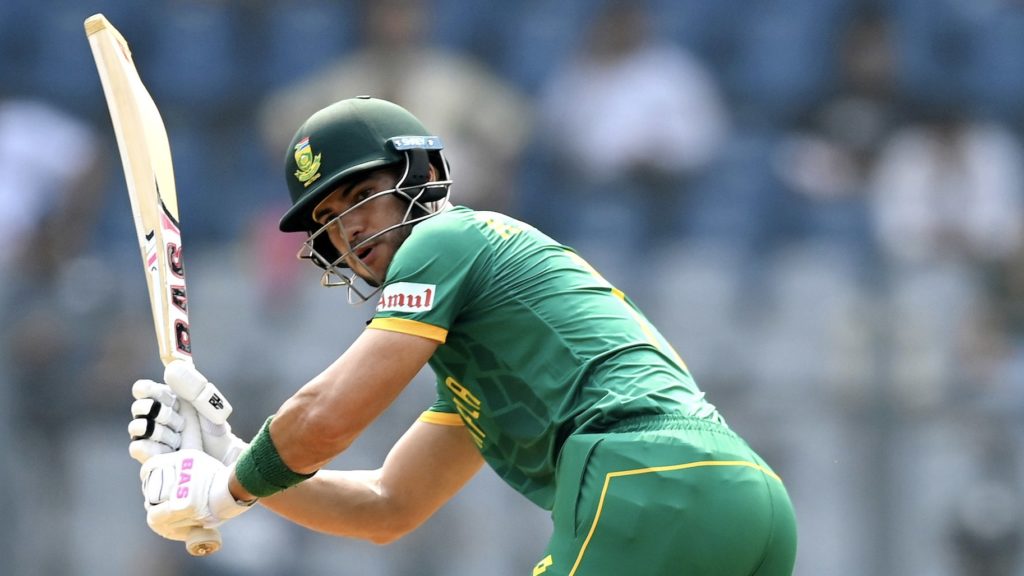Reeza Hendricks’ showing against England compounded Temba Bavuma’s struggle for runs. The selectors have a big decision to make, writes RYAN VREDE.
This feels like the 2022 T20 World Cup all over again. At the time, Hendricks was a better option by every metric that matters. Yet the selectors carried Bavuma throughout the tournament. He averaged 17.50, with a highest score of 36.
When given the opportunity prior to the T20 World Cup, Hendricks was white hot. His sequence of scores leading into the tournament read: 57, 54, 70, 74 and 21. Yet, somehow, he carried drinks for the tournament’s duration.
In the wake of their exit from that tournament, the selectors and head coach, Mark Boucher, vehemently defended their devotion to Bavuma, despite his woeful form.
Just under a year later, we’re back in this complex place.
Hendricks was a late replacement for an ill Bavuma on Saturday. He was informed of his involvement five minutes before the toss. South Africa batted first against a highly competent England attack and on a wicket that offered assistance with the new ball.
Hendricks excelled despite these circumstances, absorbing the early pressure, then accelerating his innings, finishing with a beautifully crafted 85.
HIGHLIGHTS: England vs Proteas (2023 CWC)
Hendricks’ talent has never been in question. But his performance at the Wankhede Stadium spoke to a depth of temperament that allows that talent to soar.
Asked about the likelihood of making way for Bavuma for the Proteas’ next fixture, against Bangladesh, Hendricks played straight, saying: “It’s challenging but you have to make peace with the situation and see how things unfold.
“I have to try and control what I can and that means me being ready when the opportunity arises,” he continued. “It doesn’t matter how it comes but I’m training every day, making sure I am on top of my game, controlling what I can, and making sure I wait patiently for the opportunity to come. There’s no point beating around the bush and being hard on yourself. I try to stay in a good frame of mind and, when the opportunity comes, to make sure I am on top of my game.”
Yet, privately, Hendricks can feel legitimately disappointed. Bavuma has scored eight, 35 and 16 at the World Cup to date. He is the only batsman in the top six not to register a half-century. It is clear that he is under pressure.
However, the selectors have to consider that he came into the World Cup averaging 71 in the calendar year. ODI cricket is by far Bavuma’s strongest format. He averages 50, at a strike rate touching 90.
Furthermore, Bavuma has distinguished himself as a captain. He has been tactically excellent for the bulk of the tournament while also exhibiting an appetite for unorthodoxy that has been rewarded.
Hendricks can’t be accommodated elsewhere in the batting line-up either. Every specialist batsman has excelled in one or more of their matches to date. The selectors and coaching staff appear to have found a collection of batters that cover every base – from the ability to rebuild an innings after an early stumble, to dominating the death overs, and everything in between.
Dropping a bowler, or all-rounder Marco Jansen, will adversely affect the balance of the side, and expose them in ways that were terminal to England’s challenge at this World Cup.
MORE: Proteas potent, but who stops India?
Given these considerations, Hendricks’ selection fate relies almost entirely on Bavuma’s form and the selectors’ appetite for what would be a headline-making change, should his poor form continue.
There is no cricket argument for Bavuma to be retained on the strength of his captaincy alone. Runs are the currency that pays for your selection. A lack thereof must be dealt with in unemotional terms.
I’m reminded of how Rassie Erasmus and Jacque Nienaber hooked an underperforming skipper Siya Kolisi in the 51st minute of the World Cup semi-final this past weekend. It was a decision made with the team’s interest at heart and one that was rewarded given their improved potency thereafter.
I hope Bavuma rekindles his pre-World Cup form. It matters that your captain contributes significantly to his primary discipline. But in the absence of an improved performance, it is critical that the selectors put the team’s interest ahead of an individual’s.
Photo: Gareth Copley/Getty Images







